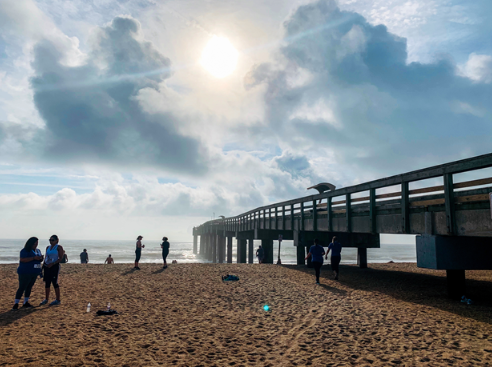By Makayla O’Connor | gargoyle@flagler.edu
St. Augustine is a tourist town because of the lovely weather and beautiful beaches, but it’s the town’s job as a whole to keep the beaches clean for the marine life.
According to seastewards.org, an estimated 14 billion pounds of trash is found in the world’s oceans every year. But some residents are trying to dampen the city’s contribution to that number.
Ed McGinley, a Flagler College natural sciences professor, is working on research to estimate how much micro-plastics have been consumed by St. Augustine sea life.
“We have found small plastic fragments inside of crab stomachs, and there is a wealth of literature on micro-plastics and ingestion by sea life,” McGinley said.
Marine life is constantly being affected by trash in the oceans and McGinley is trying to bring awareness to this and figure out how bad the problem truly is.
“These small pieces of plastic are the result of breakdown of larger pieces of micro-plastic. In some areas, the concentration of micro-plastic is actually higher than the microscopic plankton that many forms of life rely on,” McGinley said. “But micro-plastics are not the only negative. As stated earlier, larger plastic bags are consumed by whales and turtles, sea life is entangled in old monofilament fishing nets, and organisms can become entangled or harmed by other forms of plastic.”
Because of plastic in oceans, marine life is slowly absorbing it which could potentially affect our seafood supply, which in St. Augustine, is a
The first step to saving our marine life is constant beach clean-ups and making sure beach-goers clean up after themselves. Tara Dodson, St. Johns County Beach Services worker, said that their staff is constantly working to make sure the beaches stay clean.
“Our staff goes out on ATVs and picks up the trash off the beaches three to four times a week,” Dodson said. “We also have non-profit organizations contacting us about doing their own beach clean-ups.”
The service teams are always working to make sure that the beach is safe for the marine life.
“Sea turtle season starts May 1, and our sea turtle service team is constantly walking around picking up trash to keep it clean and safe for the sea turtles,” Dodson said.
Kate Happe and a group of other Flagler College students organized a beach sweep for students to volunteer and help clean up trash on Saint Augustine Beach from the pier to A Street on April 13.
“We chose to do a beach clean-up campaign because we are all very passionate about the environment and the currently plastic pollution problem. We also wanted to do something that would benefit our community,” Happe said.
The group of students want to bring awareness to the Flagler College student population on how important it is to keep our beaches clean because it’s good for the environment and Flagler is such a beach-centric college.
“The beach sweep was brought to our awareness when we realized we wanted to be a part of something that would better the St. Augustine community as well as its marine life,” Happe said.



Be the first to comment on "Working to understand, lessen effects of micro-plastics in St. Augustine"